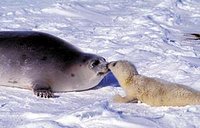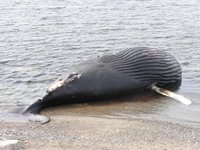
As you may know, most of the world's large mammals (including such gems as the Sabre-toothed tigers, wooly mammoths, whooly rhinocerouses, giant beavers and cave bears) were eradicated by us humans about 15,000 of years ago. As our ancestors expanded across the globe into new territories, their well-honed hunting skills and taste for meat proved a recipe for the extinction of these trusting and unwitting animals. Thousands of years later history repeated itself as
Europeans expanded into the Arctic and started clubbing the living daylights out of those cute, friendly and defenceless little mammals called seals. The
whales, those big friendly giants of the ocean, offer anothe

r obvious target for any normal bloodthirsty human in search of meat, but have proven a more resilient bunch. Oh we've done our best (see
Moby Dick), but these lumbering beasts can swim and hold their breath. With billions of liters of salt water to hide in they've proven a more difficult quarry than their ice-locked cousins the seals. Although the failures of harpoons and row boats have forced us to give up on our cravings for blubber and whale oils, sweet revenge remains within our grasp. There are many weapons available to the forces of extinction, and their numbers are constantly growing. A key part of the arsenal is oil (see
Exxon Valdez). Not only does oil deliver a devastating immediate impact, but it is
a gift that keeps on giving, targeting the whales and the rest of aquatic food chain for years after its initial release. Although
government response to outcry from
wussy environmentalists has made the classic oil tanker spill a difficult weapon to deploy in recent years,
leaky oil lines isolated from public attention in the Arctic can be used in insidious, stealth attacks on the ocean's beasts. An exciting recent inn

ovation in mammal eradication is the
whale-"watching" vessel. Unwitting sight-seers packed onto these boats take advantage of the whale's natural social instincts and draw individual animals away from the safety of their pods. These isolated whales, friendly as they are, will often form a social bond with the boats, and this combined with tourist curiosity brings the two in ever closer contact.
Misguided aboriginals may also bond with the whales and unwittingly help lure them away from safety. Eventually, the friendly naivety of the whale will bring it within close enough proximity to be chopped into a mass of inanimate blubber by the boat's razor sharp propellers.
Another effective anti-mammal operation has been developed by the ever-industrious Japanese. Not satisfied for simple cold-blooded revenge, they are determined to eat all the whale they can, hunting them under the flag of scientific discovery. So while we have yet to formally prove our inherent superiority amongst mammals by eliminating the competition, there is hope yet. Continued improvements in technology and its application to mammal eradiction will undoubtebly help to keep our bellies full and the species disappearing well into the 21st century. My message to the whales is this - if you want to continue to share this Earth with your obvious superiors, fall in line. Look to the noble examples set by laboratory mice and domesticated cattle across the world and voluntarily enslave yourself to mankind. Makes yourselves useful, otherwise your days are numbered.













 Podcast
Podcast

0 comments:
Post a Comment